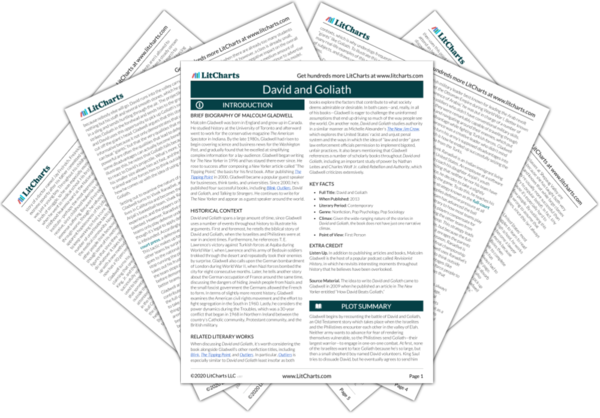Goliath Quotes in David and Goliath
Through these stories, I want to explore two ideas. The first is that much of what we consider valuable in our world arises out of these kinds of lopsided conflicts, because the act of facing overwhelming odds produces greatness and beauty. And second, that we consistently get these kinds of conflicts wrong. We misread them. We misinterpret them. Giants are not what we think they are. The same qualities that appear to give them strength are often the sources of great weakness. And the fact of being an underdog can change people in ways that we often fail to appreciate: it can open doors and create opportunities and educate and enlighten and make possible what might otherwise have seemed unthinkable. We need a better guide to facing giants […].

Unlock explanations and citation info for this and every other David and Goliath quote.
Plus so much more...
Get LitCharts A+On one level, the duel reveals the folly of our assumptions about power. The reason King Saul is skeptical of David’s chances is that David is small and Goliath is large. Saul thinks of power in terms of physical might. He doesn’t appreciate that power can come in other forms as well—in breaking rules, in substituting speed and surprise for strength. Saul is not alone in making this mistake.
Yet the puzzle of the press is that it has never become popular. […The Fordham coach] never used the full-court press the same way again. And the UMass coach, […] who was humbled in his own gym by a bunch of street kids—did he learn from his defeat and use the press himself the next time he had a team of underdogs? He did not. Many people in the world of basketball don’t really believe in the press because it’s not perfect: it can be beaten by a well-coached team with adept ball handlers and astute passers. Even Ranadivé readily admitted as much. All an opposing team had to do to beat Redwood City was press back. […] The press was the best chance the underdog had of beating Goliath. Logically, every team that comes in as an underdog should play that way, shouldn’t they? So why don’t they?
But had the police asked him if he was Beguet, he had already decided to tell the truth: ‘I am not Monsieur Beguet. I am Pastor Andre Trocmé.” He didn’t care. If you are Goliath, how on earth do you defeat someone who thinks like that? You could kill him, of course. But that is simply a variant of the same approach that backfired so spectacularly for the British in Northern Ireland and for the Three Strikes campaign in California. The excessive use of force creates legitimacy problems, and force without legitimacy leads to defiance, not submission. You could kill Andre Trocmé. But in all likelihood, all that would mean is that another Andre Trocmé would rise in his place.

Goliath Quotes in David and Goliath
Through these stories, I want to explore two ideas. The first is that much of what we consider valuable in our world arises out of these kinds of lopsided conflicts, because the act of facing overwhelming odds produces greatness and beauty. And second, that we consistently get these kinds of conflicts wrong. We misread them. We misinterpret them. Giants are not what we think they are. The same qualities that appear to give them strength are often the sources of great weakness. And the fact of being an underdog can change people in ways that we often fail to appreciate: it can open doors and create opportunities and educate and enlighten and make possible what might otherwise have seemed unthinkable. We need a better guide to facing giants […].

Unlock explanations and citation info for this and every other David and Goliath quote.
Plus so much more...
Get LitCharts A+On one level, the duel reveals the folly of our assumptions about power. The reason King Saul is skeptical of David’s chances is that David is small and Goliath is large. Saul thinks of power in terms of physical might. He doesn’t appreciate that power can come in other forms as well—in breaking rules, in substituting speed and surprise for strength. Saul is not alone in making this mistake.
Yet the puzzle of the press is that it has never become popular. […The Fordham coach] never used the full-court press the same way again. And the UMass coach, […] who was humbled in his own gym by a bunch of street kids—did he learn from his defeat and use the press himself the next time he had a team of underdogs? He did not. Many people in the world of basketball don’t really believe in the press because it’s not perfect: it can be beaten by a well-coached team with adept ball handlers and astute passers. Even Ranadivé readily admitted as much. All an opposing team had to do to beat Redwood City was press back. […] The press was the best chance the underdog had of beating Goliath. Logically, every team that comes in as an underdog should play that way, shouldn’t they? So why don’t they?
But had the police asked him if he was Beguet, he had already decided to tell the truth: ‘I am not Monsieur Beguet. I am Pastor Andre Trocmé.” He didn’t care. If you are Goliath, how on earth do you defeat someone who thinks like that? You could kill him, of course. But that is simply a variant of the same approach that backfired so spectacularly for the British in Northern Ireland and for the Three Strikes campaign in California. The excessive use of force creates legitimacy problems, and force without legitimacy leads to defiance, not submission. You could kill Andre Trocmé. But in all likelihood, all that would mean is that another Andre Trocmé would rise in his place.











